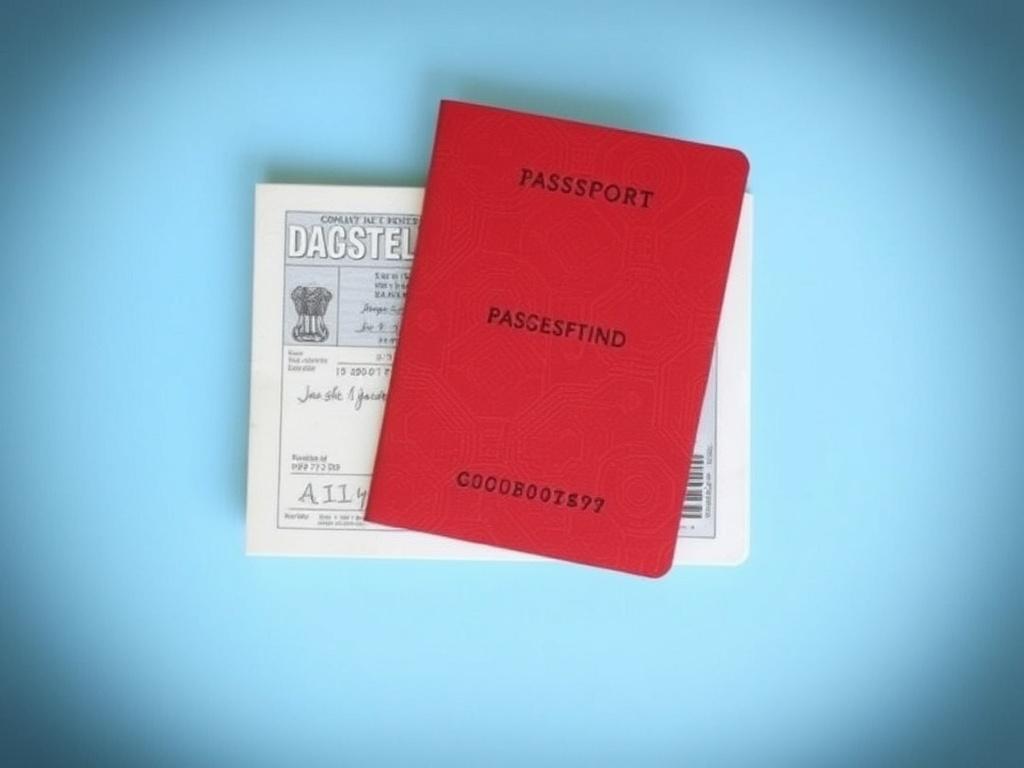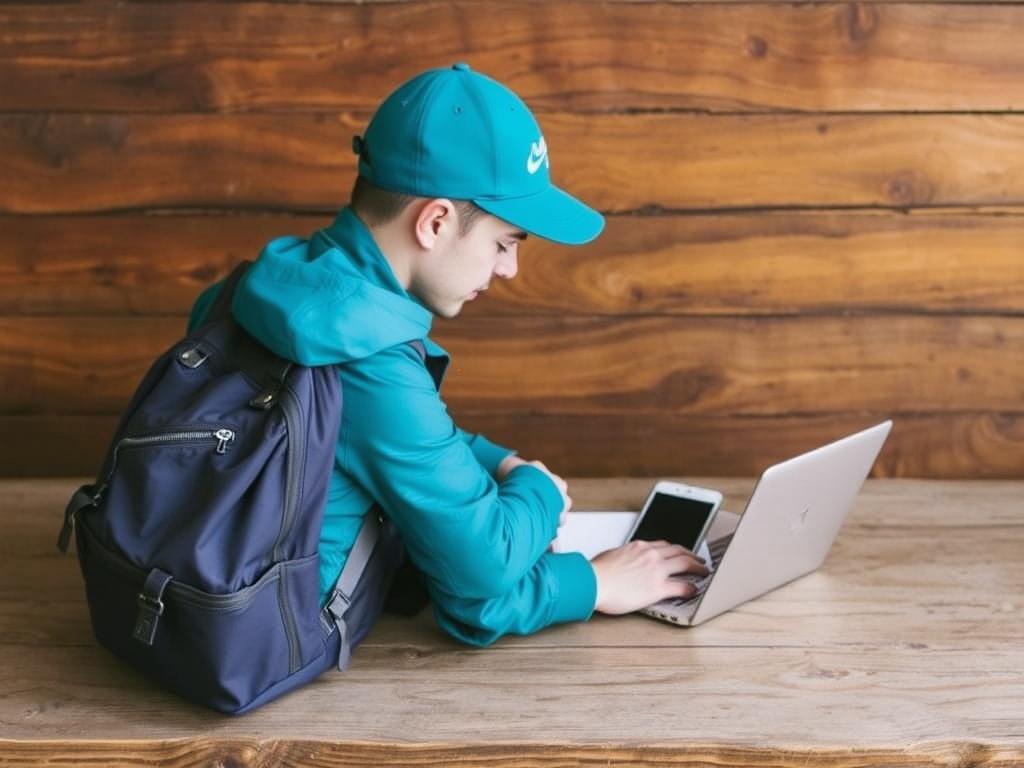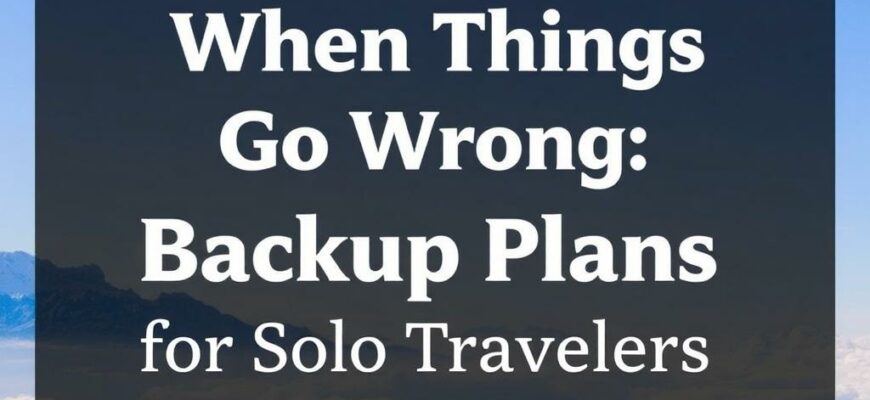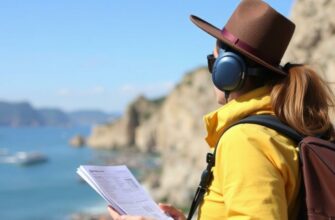Traveling alone is an adventure like no other. It offers a sense of freedom, self-discovery, and the thrill of navigating new places by yourself. However, as exhilarating as solo travel can be, it also comes with unique challenges. One critical skill for any solo traveler is preparing effective backup plans for potential mishaps. Whether it’s missed flights, lost belongings, unexpected health issues, or financial troubles, having a backup plan can save you a lot of stress and trouble. In this article, we’ll explore practical backup plans for solo travelers, highlighting how to stay safe, flexible, and calm when things don’t go as planned.
Why Every Solo Traveler Needs a Backup Plan
Travel is unpredictable by nature. When you’re journeying alone, the stakes feel higher because you don’t have a travel companion to share responsibilities or provide immediate support. Backup plans for solo travelers aren’t about expecting the worst; they’re about being prepared for the unexpected. Imagine you’re alone in a foreign country and your phone dies, or you get a sudden illness. Without a plan, you could feel helpless or overwhelmed.
Having well-thought-out contingency strategies ensures your trip doesn’t derail. It empowers solo travelers to remain independent and secure. Plus, backup plans can give you peace of mind, freeing you to enjoy your journey more fully.
Common Travel Issues and Why Backup Plans Matter
Solo travelers face a range of typical challenges. To create useful backup plans, it helps first to understand the most common scenarios where things go wrong. Here are some of the top issues:
- Lost or stolen documents and belongings
- Missed or canceled transportation
- Unexpected health emergencies
- Language barriers and communication troubles
- Financial difficulties, such as lost credit cards
- Accommodation issues
Backup plans for solo travelers should address these scenarios clearly and practically. Let’s examine each in detail with useful tips and strategies.
Backup Plans for Lost or Stolen Documents and Belongings

Losing your passport, ID, or wallet can be scary, especially when you’re solo. The key to recovery is preparation. Start by making digital and physical copies of all your important documents before you leave. Keep one set with you separately from the originals and leave another copy with someone you trust back home.
If you lose your passport, the first step is to contact your country’s embassy or consulate as soon as possible. Knowing their location and hours before you travel is a smart move. Many solo travelers also carry a photocopy of their passport and visa, which can help in emergencies.
For other lost belongings, having a trusted online backup for important files—such as travel itineraries, emergency contacts, and health insurance papers—is invaluable. Packing a minimal yet smart set of belongings can reduce loss impact.
Key Actions to Take If Documents Are Lost or Stolen:
- Immediately report to local police and obtain a copy of the report.
- Contact your embassy or consulate to get emergency travel documents.
- Inform your bank if your credit or debit cards are stolen.
- Use pre-stored emergency contacts to notify family or friends.
- Use cloud services or email to access digital copies of itineraries and permits.
Managing Missed Flights and Transportation Issues
Missing a flight or having transportation canceled can throw your solo trip into chaos. Unlike group travel where others can help adjust the plan, solo travelers must rely on quick thinking and backup options. One of the best backup plans for solo travelers is to book flights with flexible tickets or refund options when possible. Having travel insurance that covers such delays is another smart safety net.
Always double-check your flights and transportation schedules a day in advance and keep alerts turned on for any changes. Identify alternative routes or modes of transport to your destination before heading out. For example, if a flight is canceled, is there a train or bus available? Can you take a rideshare service or rent a car for the last leg?
How to Handle Missed Flight or Transit:
| Step | Action | Benefits |
|---|---|---|
| 1 | Contact your airline or transport provider immediately | Acquire next possible rebooking options and avoid missing seats |
| 2 | Check for alternative travel options or routes | Reduces wait time and helps maintain your schedule |
| 3 | Use travel insurance to claim delays | Financial protection and peace of mind |
| 4 | Update your accommodation or contacts about your delay | Prevents confusion and helps adjust plans |
Dealing with Unexpected Health Issues

Illness or injury on the road is every solo traveler’s nightmare. Since you cannot rely on someone else for direct support, backup plans for solo travelers must include clear health contingencies. Before traveling, always get a complete health checkup and discuss potential vaccines or medications needed for your destination. Carry a basic first aid kit and know where to find local clinics or hospitals.
Furthermore, purchasing comprehensive travel health insurance that covers emergency treatment and evacuation is essential. Keep emergency medical contacts saved both in your phone and on paper. If you have ongoing health conditions, bring any necessary medications and prescriptions with you, along with a doctor’s note.
Health Backup Tips for Solo Travelers:
- Buy travel health insurance with emergency evacuation coverage.
- Locate hospitals and clinics near your accommodation upon arrival.
- Carry a list of your medications and allergies in the local language.
- Know how to contact emergency services in the country you’re visiting.
- Stay hydrated, avoid risky foods, and maintain good hygiene practices.
Navigating Language Barriers and Communication Challenges
One of the biggest hurdles solo travelers face is communication—especially in countries where you don’t speak the language. This can complicate emergencies, directions, or even simple tasks like ordering food. Backup plans for solo travelers should include ways to overcome such barriers smoothly.
Learning a few basic phrases in the local language can be a lifesaver. Carry a pocket dictionary or download language translation apps on your phone that work offline. Keep digital versions of important phrases like “I need help,” “Call a doctor,” or “Where is the police station?”
Language Backup Resources:
- Offline language apps (Google Translate, Duolingo)
- Printed list of emergency phrases in the local language
- Phrasebooks specific to your destination
- Contact info for local expat communities who speak your language
Handling Financial Troubles: Lost Cards and Money
Financial difficulties like losing a wallet or card can be especially daunting for solo travelers who rely on quick access to funds. Planning ahead is critical. Carry multiple forms of payment—such as a primary credit card, a backup debit card, and some emergency cash in different currencies. Store cards separately so that losing one does not mean losing all your money.
Notify your bank before travel about your trip dates to prevent your card from being blocked due to suspicious activity. Also, knowing how to access emergency cash or quick transfers through services like Western Union or PayPal can help you in a crunch.
Financial Backup Strategies:
| Strategy | Description | Why It Matters |
|---|---|---|
| Multiple Payment Methods | Carry more than one credit or debit card, plus some cash | Risk reduction if a card is lost or blocked |
| Bank Notification | Inform bank of travel plans ahead of time | Prevents card blockage due to foreign transactions |
| Emergency Cash Access | Have access to wire transfer or mobile money apps | Quick funds if cards are lost or stolen |
| Use Travel Credit Cards | Cards that offer travel protection and fraud alerts | Added security and potential reimbursement |
Contingency Plans for Accommodation Problems
Finally, accommodation issues can throw off independently traveling plans, especially if you arrive late, there’s an overbooking, or the place is unsafe. Booking accommodation with flexible cancellation policies or through reputable platforms is a smart way to create a backup. Researching at least two lodging options ahead of time gives you alternatives.
Also, sharing your accommodation information with a trusted friend or family member creates an added layer of safety. Make sure you have contact details for your host or hotel and directions connected to local landmarks.
Accommodation Backup Tips:
- Choose accommodations with free cancellation or flexible terms.
- Keep a list of alternative hotels or guesthouses nearby.
- Confirm your booking a day before arrival.
- Share your accommodation details with someone you trust.
- Have the address and phone number saved offline for easy retrieval.
Practical Tools and Technology to Support Backup Plans

Solo travelers can leverage various tools and technology to strengthen their backup plans. Travel apps, cloud storage, and communication tools build a strong safety net. Here are a few essentials:
- Cloud Storage Services: Google Drive, Dropbox for storing copies of important documents, itineraries, and insurance papers.
- Travel Insurance Apps: Many insurers provide apps for direct claims and emergency help.
- Offline Maps & Translation: Apps like Maps.me and Google Translate offline modes are essential for communication and navigation.
- Emergency Contact Apps: ICE (In Case of Emergency) apps store vital medical and contact info accessible even without unlocking your phone.
- Mobile Banking and Payment Apps: Enable swift financial management and monitoring.
Building Confidence Through Preparedness
The essence of backup plans for solo travelers is building confidence to handle whatever curveballs travel throws. Preparing these plans doesn’t dampen the spirit of adventure—it enhances it. You can embrace each step of your journey knowing you have strategies in place if things go wrong.
Simple steps like sharing your itinerary with a trusted contact back home, carrying essential backups, and having insurance can transform your solo travel experience from anxiety-filled to empowering. Remember, the best backup plan is the one that fits your needs, destination, and travel style.
Conclusion
When things go wrong during solo travel—and sometimes they will—having a well-crafted backup plan is your lifeline. By preparing for lost documents, missed flights, health emergencies, language barriers, financial troubles, and accommodation issues, you equip yourself with resilience and resourcefulness. Backup plans for solo travelers are not just about expecting trouble but about creating a safety net that supports your freedom and independence. With a little foresight, smart tools, and practical strategies, solo travel can remain a thrilling, safe, and empowering adventure no matter what surprises the road throws your way.









